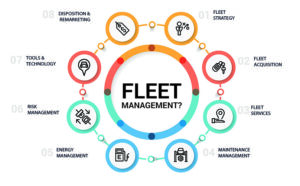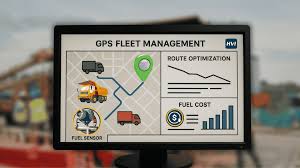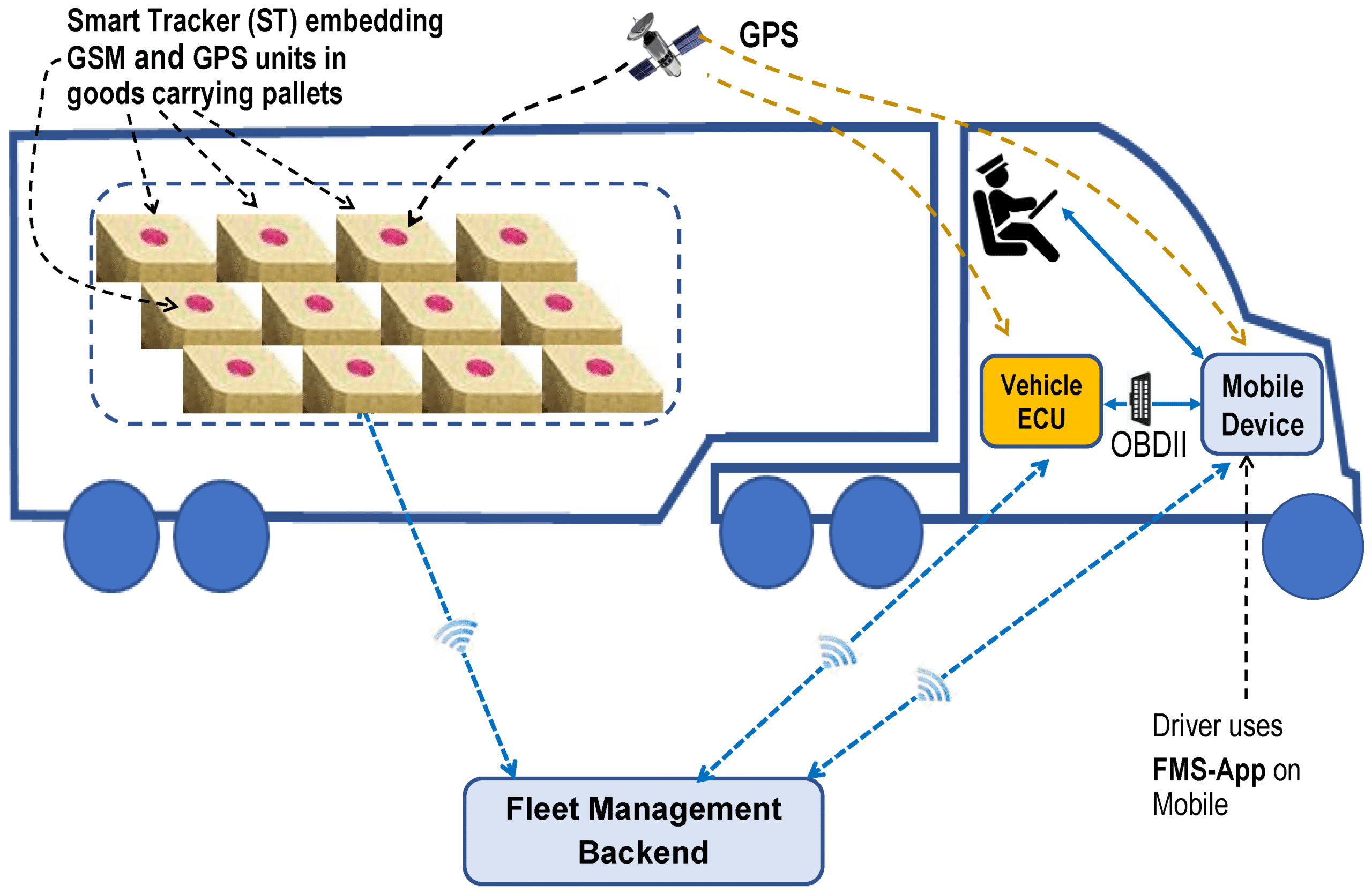The logistics sector in the United Arab Emirates has rapidly evolved into one of the region’s most dynamic industries. With its strategic location, world-class infrastructure, and status as a global trade hub, the UAE is home to thousands of logistics companies managing complex supply chains, last-mile deliveries, and cross-border transportation. In such a high-stakes environment, fleet efficiency, driver safety, cost control, and real-time visibility are no longer optional — they are mission-critical. This is where fleet management system become essential for success.
Fleet management system is no longer a luxury or a trend — it is a competitive necessity. From small courier services in Dubai to large-scale freight operators in Jebel Ali, every logistics business in the UAE stands to benefit immensely from adopting a modern, integrated fleet management system.
Rising Operational Challenges in the UAE Logistics Sector

As demand for faster deliveries and seamless logistics operations increases, UAE logistics companies are under more pressure than ever. High fuel costs, traffic congestion, route inefficiencies, unexpected vehicle breakdowns, and increased regulatory oversight can quickly disrupt schedules and inflate operational costs. Additionally, managing large fleets manually results in poor visibility, wasted resources, and greater risk of compliance issues.
With logistics now operating 24/7, and customers expecting real-time tracking and instant communication, the traditional methods of fleet supervision are outdated and unsustainable. These challenges underscore the need for digital transformation through intelligent fleet management system.
Fleet Management Systems Improve Operational Visibility

One of the most immediate benefits of implementing a fleet management system is real-time visibility into fleet operations. With GPS tracking and telematics integration, logistics companies can monitor the exact location, speed, and status of each vehicle at any given moment. This visibility enables proactive decision-making, route optimization, and rapid response to unexpected disruptions such as traffic jams, vehicle failures, or delayed deliveries.
This real-time monitoring provides fleet managers with the insights needed to keep operations on schedule, improve customer satisfaction, and reduce manual communication overheads. In a country like the UAE, where long-distance trucking across borders is common, the ability to track and manage cross-emirate operations is invaluable.
Cost Savings Through Fuel and Maintenance Optimization
Fuel is one of the most significant operating costs in logistics, especially in the UAE where distances can be vast and fuel usage is high. Fleet management systems help track fuel consumption patterns and identify inefficiencies such as harsh acceleration, engine idling, or poor route planning. By detecting these issues, fleet managers can take corrective action to reduce fuel usage and lower emissions.
In addition, predictive maintenance tools alert managers when a vehicle is due for servicing based on mileage, usage, or diagnostics data. This reduces the risk of breakdowns, avoids costly emergency repairs, and extends the lifespan of vehicles. Preventative maintenance scheduling becomes data-driven rather than reactive, resulting in long-term cost efficiency.
Enhanced Driver Performance and Safety

Fleet management system in the UAE are also vital for improving driver behavior and ensuring safety compliance. Through driver scorecards, behavior tracking, and real-time alerts, businesses can monitor incidents such as speeding, sharp braking, and unauthorized vehicle usage. By identifying high-risk driving patterns, managers can implement targeted training programs and reward safe driving practices.
This is especially important in the UAE, where road safety regulations are strictly enforced, and companies are held liable for driver misconduct. Reducing accident rates not only protects human life but also minimizes downtime, insurance premiums, and vehicle damage. Ultimately, a safer fleet is a more profitable fleet.
Streamlined Compliance with UAE Transport Regulations
The UAE government continues to implement strict transportation laws to regulate vehicle safety, emissions, and driver behavior. From smart tachographs and roadworthiness requirements to ELD (electronic logging devices) mandates and cargo restrictions, fleet operators must remain compliant or face penalties and business disruptions.
A robust fleet management system helps ensure full compliance by automating record-keeping, scheduling inspections, and generating audit reports. Real-time alerts can notify operators of expiring vehicle documents or missed inspections, allowing businesses to maintain legal conformity across all Emirates.
Improving Customer Experience Through Real-Time Updates
Today’s customers expect instant delivery notifications, precise arrival estimates, and the ability to track their orders from start to finish. Fleet management systems allow logistics companies to meet these expectations by offering real-time delivery tracking, automated notifications, and live ETAs.
This transparency significantly improves customer satisfaction and loyalty, particularly in the e-commerce and last-mile delivery sectors. Whether delivering packages in Sharjah or heavy goods to Abu Dhabi’s industrial zones, real-time visibility builds trust and eliminates uncertainty from the customer journey.
Scalability for Growing Logistics Operations
As UAE-based logistics companies expand their operations to new regions or increase their vehicle fleets, managing this growth without digital tools becomes a logistical nightmare. Fleet management systems offer the scalability needed to manage dozens or even hundreds of vehicles, drivers, and routes simultaneously.
With cloud-based dashboards and mobile access, managers can oversee multiple depots or hubs from a central location. Reports, analytics, and predictive models allow for data-driven planning, budgeting, and forecasting as the business grows. This scalability ensures operational stability during periods of rapid expansion — a frequent occurrence in the fast-paced UAE logistics environment.
Supporting Sustainability and Green Logistics Goals
Environmental responsibility is becoming a key priority for both government and private sectors in the UAE. Logistics businesses are expected to reduce their carbon footprint and adopt green transportation initiatives. Fleet management systems support this goal by promoting fuel efficiency, reducing idle times, and tracking emissions output per vehicle.
With the UAE investing heavily in sustainable infrastructure and smart mobility, logistics companies that adopt eco-conscious practices will be better positioned to win government contracts and meet upcoming regulatory standards. Fleet systems that monitor CO₂ emissions and energy consumption will be crucial for achieving these sustainability benchmarks.
Competitive Advantage in the Regional Logistics Market
The logistics market in the GCC is intensely competitive, and having a fleet management system gives UAE-based logistics firms a strategic edge. Faster delivery times, fewer delays, improved customer satisfaction, and lower operating costs all contribute to stronger client relationships and higher profitability.
In regions such as Dubai South, Jebel Ali Free Zone, and Abu Dhabi Industrial City, clients and partners often prefer logistics companies that use modern tracking and fleet systems to guarantee reliability. Being technologically advanced is not just about convenience — it’s a direct reflection of operational professionalism and future-readiness.
Conclusion
In a country like the UAE, where trade, transport, and infrastructure are key pillars of economic growth, logistics businesses must embrace digital transformation to remain competitive. Fleet management systems are the foundation of that transformation. They provide real-time visibility, cost savings, safety improvements, and regulatory compliance — all while enabling scalability and sustainability.
From startups with small delivery vans to enterprise logistics fleets handling cross-border freight, the need for intelligent fleet management has never been greater. Investing in the right system not only streamlines operations but positions your business at the forefront of the UAE’s logistics evolution.


